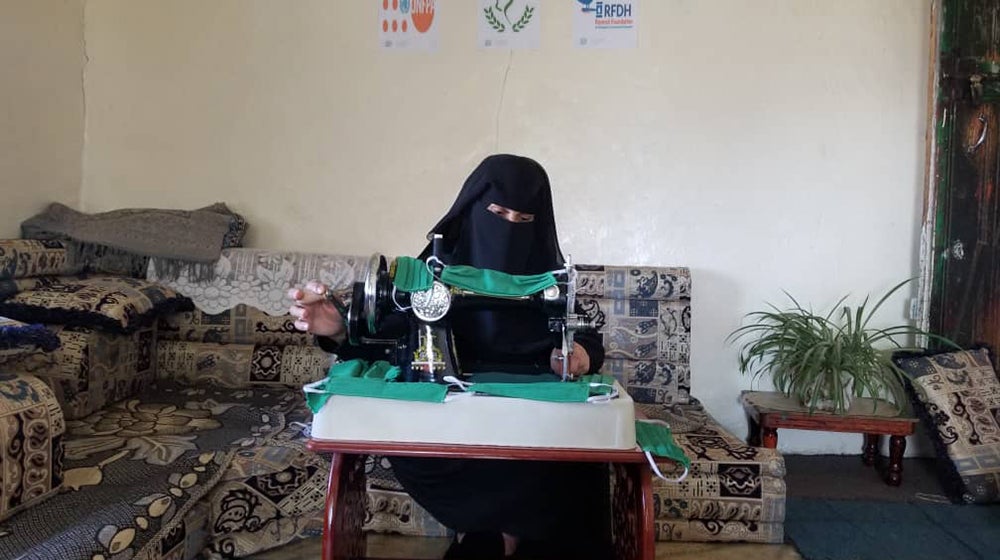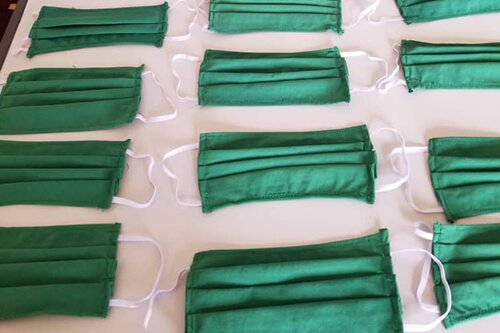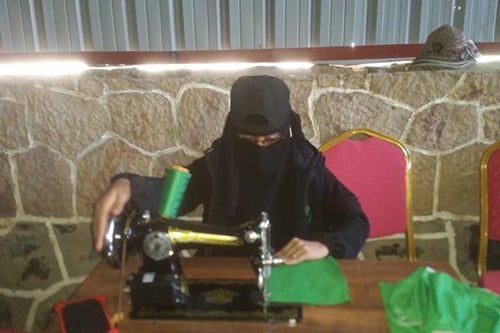With Yemen’s health system approaching a breaking point, displaced women sew face masks to protect community

SANA’A, Yemen – With more than 130 confirmed cases of COVID-19, Yemen is struggling to keep the full impact of the pandemic at bay, even as funds for life-sustaining health services are running out.
The country’s health services are already at a breaking point after a relentless five years of conflict. Reproductive health care is particularly depleted, with only 20 per cent of the health system now able to provide maternal and child health services. And without urgent funding, more than a hundred health facilities providing these services will close.
If the COVID-19 pandemic spreads widely through Yemen, consequences for health services and the community could be catastrophic.
“My biggest fear is that my country does not have the necessary facilities to fight this virus,” said Deena, a woman from Al Hudaydah Governorate who has been displaced by the conflict.

Now living in Raymah, she has precious few resources to contribute to pandemic prevention efforts. Even so, she is doing everything she can.
“I have started raising awareness among my family members and my networks,” she said.
She is also sewing face masks to help prevent the spread of the illness. “I know I am helping other displaced people like me, who have very little to keep themselves protected from this virus.”
Women and girls spearheading community protection efforts
Women and girls are already shouldering much of the burden of the crisis. Economic pressures caused by the conflict – and now the pandemic – have made them more vulnerable to gender-based violence and negative coping mechanisms such as child marriage and human trafficking.
Yet women and girls are leading a major effort to prevent the spread of COVID-19. Those attending UNFPA-supported safe spaces, like Deena, have collectively made more than 15,000 face masks that have been distributed in communities and displaced camps.
During distribution, recipients learn about the correct use of the masks as well as other infection-prevention measures.
UNFPA currently supports 42 safe spaces – with funding from Iceland, Japan, Netherlands, Norway, Sweden and Switzerland – as part of efforts to empower women and provide services for survivors of gender-based violence. The spaces provide access to counseling, health services and income-generating projects.
After attending tailoring classes at her safe space in Raymah, Deena was able to support her family with an income. Now, she is eager to use those skills as part of the pandemic response. “The safe space provided us training and materials to produce these masks,” she said.
Jannat, 17, is also happy to put her sewing skills to use for her community.
Jannat began sewing dresses at her local safe space, helping to support her family after her father lost his job. Now, she said, “I feel proud that I am sewing these masks and help to protect people from this deadly virus.”

Funding crisis rolling back support
The safe spaces are also adapting to the new realities of the pandemic. Many spaces are scaling down operations to facilitate social distancing and prevent disease transmission. Services, such as psychological support, are being provided remotely where possible.
But funding is running out, which will affect both reproductive health care as well as services to prevent and respond to gender-based violence.
UNFPA requires $59 million to continue its humanitarian operations in Yemen. If this funding does not materialize, as many as 140 reproductive health facilities could close, cutting off health services to some 320,000 pregnant women. A projected 48,000 could die from complications of pregnancy and childbirth, UNFPA estimates.
As of 16 May, many of these health facilities began closing their doors. Safe spaces could also be force to shut their doors in the coming months.
A pledging conference will be held virtually on 2 June, hosted by the United Nations and the Kingdom of Saudi Arabia.
“UNFPA is hopeful donors will understand the urgency of funding to save lives in Yemen, and that the Riyadh Pledging Conference will bring us the much-needed funding to help hundreds of thousands of women who have been caught in the triple crisis of conflict, famine and cholera, and now COVID-19,”said Nestor Owomunhangi, UNFPA’s acting representative in Yemen.
A version of this article was posted on unfpa.org on May 19, 2020.